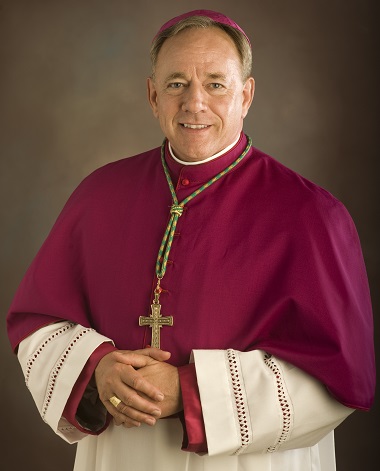
Archbishop Michael Miller said, “we pray that this Vatican document will open new doors through which we can share God’s love and mercy.”
The Vatican announced December 18 that Catholic priests can administer blessings to same-sex couples – and the news was widely reported worldwide.
CBC Radio’s As it Happens responded that evening by posting an upbeat Q&A with Fr. James Martin. They noted, “Martin – a Jesuit priest in New York who has long advocated for LGBTQ inclusion in the church – welcomed the news.”
Martin said:
The church is saying to me as a priest: You can do it now – with certain limitations, as long as it doesn’t seem like a marriage – which I couldn’t do yesterday.
And what it is saying to same-sex couples is that: We value you, and we want God to bless you as individuals and we hear you.
It’s a really big step. It’s kind of hard to overstate, because I think, for so long, people have thought that the church was just anti-same-sex everything. And so it’s a big surprise and a nice early Christmas gift for LGBTQ Catholics.
One day later The B.C. Catholic the posted a nuanced overview of the Vatican declaration, Fiducia Supplicans.
‘Same-sex blessings are about welcoming, not changing Church teaching, bishops say’ began:
The Archdiocese of Vancouver is considering how the Pope’s declaration on the blessing of irregular unions can contribute to making the Church in Vancouver “an ever more welcoming community,” said Archbishop J. Michael Miller.
On Monday, the Vatican released the declaration Fiducia Supplicans on the pastoral meaning of blessings. The document on blessing same-sex attracted people was approved by Pope Francis and says priests can bless couples in irregular situations as an expression of pastoral closeness without condoning their sexual relations.
Archbishop Miller said the document aims to “broaden” and “enrich” the concept of “blessing” in the Catholic Church, encompassing the possibility of blessing couples in irregular situations, such as same-sex couples or those who are divorced and remarried without an annulment.
The Archbishop said Fiducia Supplicans allows priests to consider “very precise pastoral situations” for blessing couples in irregular situations, “without officially validating their status or changing in any way the Church’s perennial teaching on marriage.”
“The declaration clearly affirms the traditional doctrine of the Church about marriage between a man and a woman,” he said, and excludes “any type of liturgical rite or blessing similar to a liturgical rite that could create confusion about the sacrament of matrimony.”
The blessing of sinners is an important element of Catholic theology, said the Archbishop, noting that the faithful acknowledge their sinfulness and ask for blessings in the Lord’s Prayer, in the penitential act at Mass, and receiving ashes on Ash Wednesday.
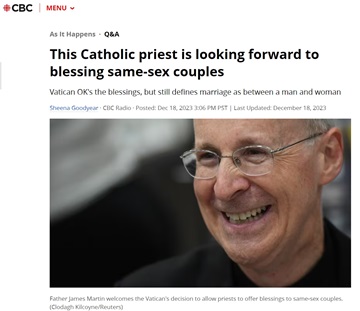 During his interview, Martin said:
During his interview, Martin said:
Two years ago . . . this same [Vatican] department, came out with a document. When asked by someone, “Can we do this? Can priests do this?” they said no, because “God cannot and does not bless sin.”
There was a really strong reaction to that. Pope Francis even distanced himself from that.
Subsequently, a new head of that dicastery, or department, was named, Cardinal [Víctor Manuel] Fernández. And then just a couple of weeks ago, Pope Francis signalled an openness to revisiting this question, and then he wrote this declaration.
The Pope opened up the door, and Cardinal Fernández walked through it.
The B.C. Catholic article, which also considered the response by the Canadian Conference of Catholic Bishops, stated: “The declaration, which was reviewed and signed by Pope Francis, offers ‘new clarifications’ on the DDF’s 2021 guidance on the topic.”
Push for blessing
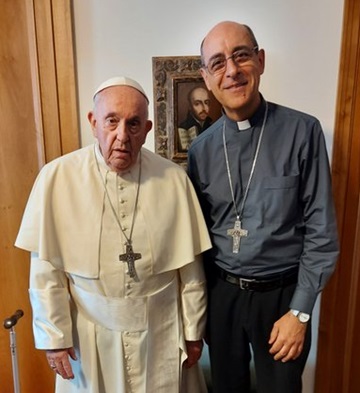
Pope Francis appointed Cardinal Victor Manuel Fernández as Prefect of the DDF last fall. Image: @Tuchofernandez
The B.C. Catholic article acknowledged that the new Vatican declaration will be controversial, noting in particular the push for liturgical blessings of same-sex couples in Germany and Belgium:
But the ruling – the latest in a flurry of documents published by the DDF [Dicastery for the Doctrine of the Faith] since Cardinal Victor Manuel Fernández, Pope Francis’ longtime theological adviser, took over as prefect in September – is likely to generate further controversy on the issue, with both proponents and critics seeing it as a possible opening to additional changes down the road.
The Catholic Church has been enmeshed in such issues over several decades. John T. McGreevy in Catholicism: A Global History from the French Revolution to Pope Francis (Norton, 2022) described a shift in approach from the top:
As in other areas of sexual ethics, John Paul II and Cardinal Ratzinger dug in. Ratzinger [later Pope Benedict XVI] . . . identified a homosexual orientation (using neo-Thomist vocabulary) as “a more or less strong tendency ordered toward an intrinsic moral evil.” . . .
Soon after his election, Francis began to edge the church away from the front lines of culture wars over sexuality and gender. His own opposition to abortion and same-sex marriage was traditional and he recognized that Catholics in the Global South, as a rule, were more conservative, not less, on these issues. He rattled liberals by referencing the active role of the devil.
But his tone was different. He famously answered “Who am I to judge?” when asked about gay Catholics. He expressed support for same-sex unions. He mentioned abortion only occasionally.
Pastoral vs liturgical
Echoing the Vatican declaration, The B.C. Catholic article highlighted that “The basis for the DDF’s guidance on blessing same-sex couples is grounded in an apparently novel distinction between the liturgical and “pastoral-theological” understanding of blessings.”
Writing on behalf of the DDF, Cardinal Fernández said:
The value of this document, however, is that it offers a specific and innovative contribution to the pastoral meaning of blessings, permitting a broadening and enrichment of the classical understanding of blessings, which is closely linked to a liturgical perspective.
Such theological reflection, based on the pastoral vision of Pope Francis, implies a real development from what has been said about blessings in the Magisterium and the official texts of the Church. This explains why this text has taken on the typology of a “Declaration.”
It is precisely in this context that one can understand the possibility of blessing couples in irregular situations and same-sex couples without officially validating their status or changing in any way the Church’s perennial teaching on marriage.
Archbishop Miller stated that the “reflection process” will take time, but “we pray that this Vatican document will open new doors through which we can share God’s love and mercy.”
Go here for full B.C. Catholic article.
Welcome initiative
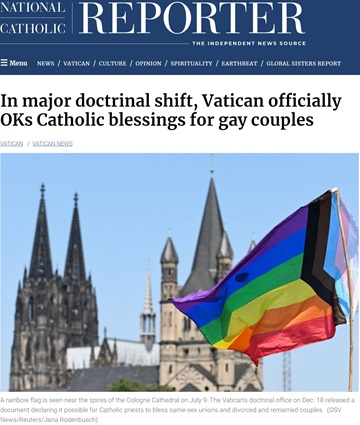 Many Catholics, along with Fr. James Martin, warmly support the Vatican’s initiative.
Many Catholics, along with Fr. James Martin, warmly support the Vatican’s initiative.
For example, Cardinal Blase Cupich, generally considered an ally of Francis, said in a statement, ““Here in the Archdiocese of Chicago, we welcome this declaration, which will help many more in our community feel the closeness and compassion of God,”
And a December 18 article in National Catholic Reporter stated:
While extremely narrow in scope, the Dec. 18 “declaration” from the powerful Dicastery for the Doctrine of the Faith may serve as the most concrete pastoral shift on the church’s stance toward gay couples in the church’s centuries’ long history.
But even supporters expect future challenges.
Confusion
A January 8 follow-up National Catholic Reporter article acknowledged:
The Vatican’s recent declaration permitting some form of blessing for couples in same-sex relationships has inflamed the long-standing theological and cultural battles inside the Catholic Church.
The declaration might be somewhat confusing for people who have held onto the belief that same-sex relationships are themselves immoral and as such cannot be blessed by the church. For those people, the bestowal of blessings is seen as an affirmation. With the conclusion that same-sex relations are themselves immoral, the logical conclusion is thus to refuse the blessing of them by the church.
The article then urged readers to “pay close attention to the progressive approach embraced by Pope Francis,” noting earlier statements (including the famous “Who am I to judge?”) and noting that “Francis’ approach is an insistence on the dynamic nature of tradition. . . . The Vatican’s new declaration speaks to a richer understanding of grace, and how blessings can make grace real.”
A January 9 National Catholic Reporter article included this portion:
Same-sex relationships remain prohibited in many African countries. One Nigerian priest, Schoenstatt Fr. Ugochukwu Ugwoke told NCR that the Vatican’s new document “seems to be shrouded in ambiguity and many people are confused.”
Ugwoke is one of many priests across the African continent who have voiced strong criticisms of the new Vatican document. He said there are currently two groups — those who agree with the declaration and those who oppose it on the grounds that it may change the church’s position on marriage being a sacramental union between a man and woman.
Go here, here and here for the National Catholic Register articles referred to.
Critical responses
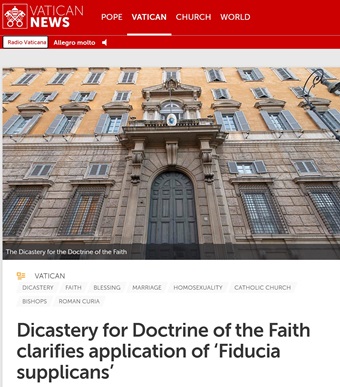 Many critics of the declaration have found that it leads to confusion, at best, and likely signals a clear turn away from traditional teachings. A January 4 report on CBC News titled ‘Vatican tries to calm bishops over blessings for same-sex couples,’ noted:
Many critics of the declaration have found that it leads to confusion, at best, and likely signals a clear turn away from traditional teachings. A January 4 report on CBC News titled ‘Vatican tries to calm bishops over blessings for same-sex couples,’ noted:
The Vatican on Thursday moved to calm Catholic bishops in some countries who have reacted negatively to last month’s approval of blessings for same-sex couples, telling them that the measure is not “heretical” or “blasphemous.”. . .
The fact that the Vatican needed to issue a five-page clarification of an eight-page declaration little more than two weeks after it was issued appeared to underscore the extent of the confusion it caused in many countries.
A January 5 follow-up on the B.C. Catholic site posted the DDF’s “press release concerning the reception of Fiducia supplicans.“
The conservative (and primarily Catholic) magazine First Things has featured at least three articles raising serious concerns:
- Dan Hitchens, Senior Editor at First Things: The Pope and the Black Hole: “In a by now familiar sequence of events, the Vatican released a document on Monday which caused instant confusion.”
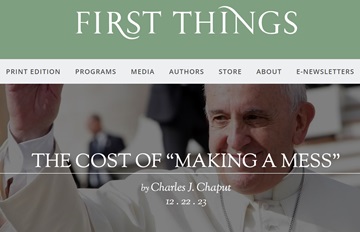 Charles J. Chaput, Archbishop Emeritus of Philadelphia: The Cost of Making a Mess: “while the document does not in fact change Church teaching on marriage, it does seem to change Church teaching on the sinfulness of same-sex activity.”
Charles J. Chaput, Archbishop Emeritus of Philadelphia: The Cost of Making a Mess: “while the document does not in fact change Church teaching on marriage, it does seem to change Church teaching on the sinfulness of same-sex activity.”- Carl Trueman, professor of biblical and religious studies at Grove City College and a fellow at the Ethics and Public Policy Center: The Pope, Same-Sex Blessings and Protestants: “For Protestants (and likely many Catholics), this is a reminder that the papacy is not a cure-all for the alleged problems surrounding Protestant notions of scriptural sufficiency and clarity.”
Clemente Lisi, executive editor at Religion Unplugged, offered a useful overview of a wide range of responses to the declaration in this December 19 article, What Catholics are Saying About Pope’s Decision to Bless Same-Sex Couples.
Like the Anglicans?
It is interesting that the Vatican statement was delivered just one day after same-sex blessings were officially sanctioned in the Church of England, following years of debate.
Division has plagued the global Anglican Communion, with many African (and other church leaders decrying any moves toward the recognition of same-sex relationships. GAFCON (Global Anglican Future Conference) and the GSFA (Global South Fellowship of Anglican Churches) have distanced themselves formally from the Archbishop of Canterbury and the Church of England.
The Roman Catholic Church is not the Anglican Church, but similar differences in outlook seem to be appearing between the West (Europe in particular) and much of the Global South.
Local scholar John Martens wrote an enlightening comment for America: The Jesuit Review January 5: ‘Pope Francis’ focus on the Bible and mercy – and why so many Catholics are uncomfortable with it.’
He refers back to a piece he wrote for America 10 years ago, when Cardinal Jorge Mario Bergoglio was elected pope, and to the international conference (organized by his team) and held at St. Mark’s College on the UBC campus last spring: ‘Pope Francis and the Future of the Church: Prospects and Challenges for Renewal.’
He does not focus on Fiducia Supplicans – but his comments are certainly relevant to the lively ongoing discussion.
